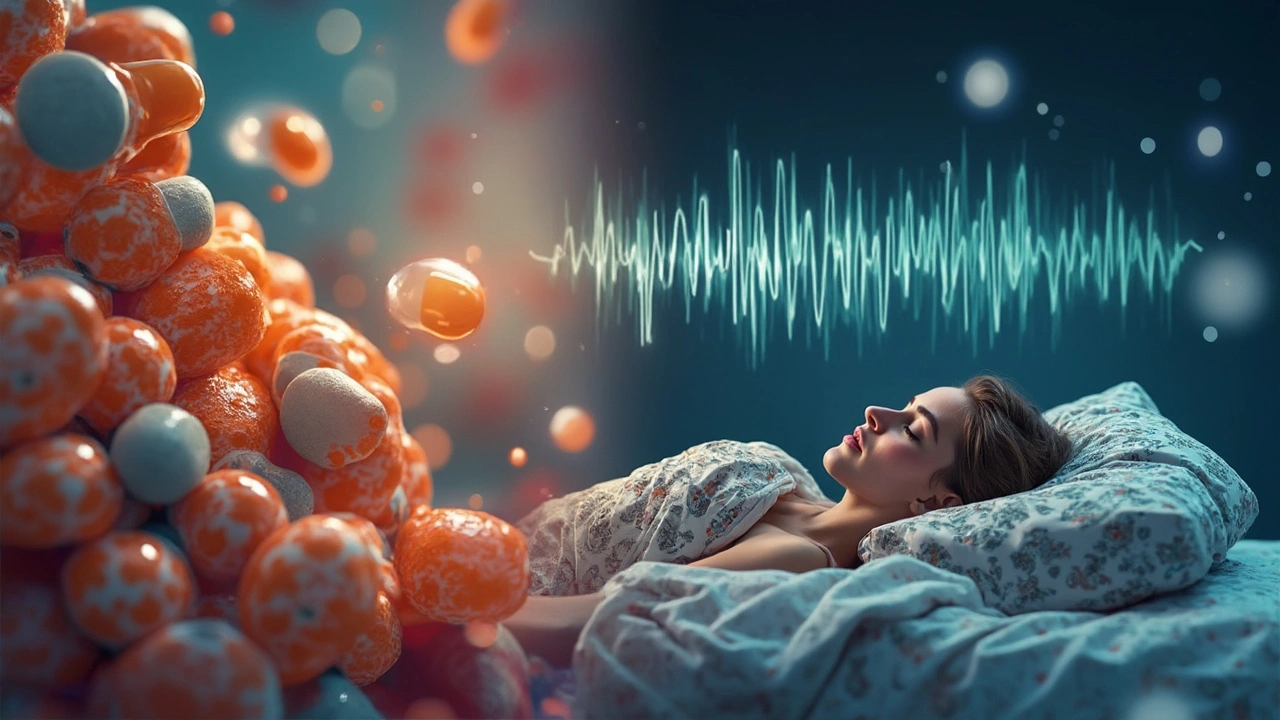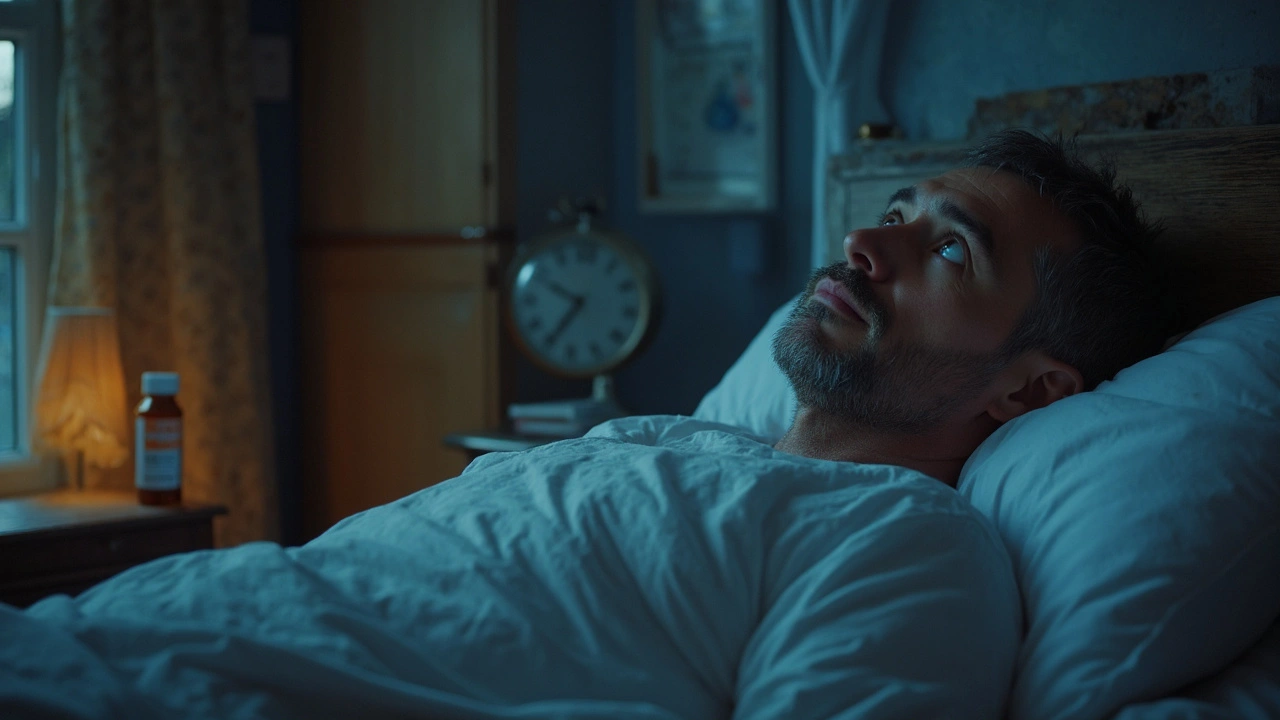Picture this: you're taking your nightly statin pill like always, trying to stay on top of cholesterol, but suddenly you start waking up at 3 a.m. sharp. Night after night, you're tossing around, staring at the ceiling, and thinking, Did my medication mess with my sleep? It's not just you; search trends about 'statins and sleep' have shot up in the last two years, proving this question keeps plenty of people up late.
What Do We Really Know About Statins and Sleep?
Statins are everywhere. Here in Australia, more than 2.5 million scripts get filled each month. They're hailed as life-saving drugs for millions with high cholesterol, yet when it comes to sleep, the story is not black and white. Some folks on statins say they drift off just fine, while others begin counting sheep… then cows, kangaroos, and anything else. Let's unpack the facts.
There’s a ton of research, but it’s often conflicting. Take a look at the 2015 review published in the journal “Sleep Medicine Reviews,” where researchers dug through heaps of studies on statins and sleep. Some studies found zero connection—meaning statins neither hurt nor help sleep. But a few showed that certain people get insomnia, vivid dreams, or even nightmares after starting statins. Others found people slept a little longer or woke less often.
What’s going on? A lot could come down to how statins interact with the brain. Most people know statins work by blocking an enzyme in your liver to lower cholesterol. But cholesterol isn’t just a villain; it plays a vital role in your brain, helping to create the building blocks of cells and brain chemicals. Since sleep is controlled by these chemicals, changing cholesterol could (in theory) mess with your REM cycles or how long you spend in light sleep versus deep sleep.
Not every statin acts the same way, either. Atorvastatin and simvastatin, for example, can cross the blood-brain barrier more easily than others like pravastatin or rosuvastatin. This means they might have a greater effect on neurotransmitters that regulate sleep-wake cycles.
It gets even more interesting when you look at actual sleep measurements, not just people’s complaints. One clinical trial from 2008 used polysomnography (the gold standard for studying sleep) and found no big differences in REM or non-REM sleep between people on simvastatin and those not taking statins. Yet, smaller studies have popped up showing that, for certain sensitive folks, statins really do shake up REM and produce those vivid dreams or cause frequent awakenings.
People react differently, probably due to genetics, age, and what other medications they’re taking. Trouble sleeping can also be caused by “nocebo effect” — that’s when you expect side effects and actually develop them, even if the drug isn’t directly to blame.
If you’re interested in a deep dive, there’s a practical post about statins and sleep quality, where you’ll find tips and a breakdown of different statins’ effects.
| Statin Type | Can Cross Blood-Brain Barrier? | Reported Sleep-Related Side Effects |
|---|---|---|
| Atorvastatin | Yes | Insomnia, vivid dreams (some reports) |
| Simvastatin | Yes | Nightmares, sleep disturbances |
| Pravastatin | Minimal | Rare sleep effects |
| Rosuvastatin | Minimal | Least likely for sleep issues |

Statins and REM, Insomnia, and Daytime Fatigue: Decoding the Mystery
Sometimes, it feels like everyone has a story about a medication either helping or sending their sleep haywire. With statins, the evidence is a bit of a ‘choose your own adventure.’ Still, let’s separate the science from the scuttlebutt when it comes to REM cycles, insomnia, and why some people start feeling totally wrecked after breakfast.
REM (Rapid Eye Movement) sleep is that wild phase where you dream, process memories, and your brain sorts through the day’s junk. Insomnia, meanwhile, means you’re struggling to fall or stay asleep, and all of that leads right to the next-day crash: daytime fatigue. A 2014 study in “Current Neuropharmacology” took a shot at figuring out if statins impact REM. The researchers noticed subtle differences, especially in people over 65 or those on high-dose atorvastatin or simvastatin. Quality of REM sometimes dipped—and, honestly, when REM gets disrupted, people notice because their dreams get weirder and waking up is harder.
Insomnia linked to statins may start fast or after weeks. A few people say they feel “wired” after starting their statin, almost like having a late arvo coffee. What’s the biological reason? The theory is that by changing how cholesterol works in the brain, statins could tweak the balance between serotonin and melatonin. That’s a big deal, because melatonin sets your circadian rhythm, your 24-hour ‘sleep clock.’ When that’s off-kilter, good luck falling asleep—or waking up refreshed. But if you run a sleep tracker (hey, who doesn’t these days?), it’s hard to spot a pattern that lines up perfectly with a statin dose. Which just fuels the confusion.
Now, let’s not forget good old muscle pain—a classic statin side effect. If your legs ache all night, or you’re getting cramps at 2 a.m., obviously that messes with sleep as much as anything happening in your brain. Daytime fatigue often follows like an unwelcome shadow.
For some, the answer arrives after weeks of trial and error—switching brands, dropping the dose, changing the time they take it. In Australia, some GPs have suggested taking statins with dinner instead of bedtime, hoping to avoid that wired feeling late at night. It works for certain people, especially those most sensitive to sleep disruption. Others experiment with low-dose statins or alternatives like ezetimibe, which don’t touch brain chemistry much.
Recent surveys in 2023 showed about 4% of people on statins reported new sleep issues, while those not on statins had a slightly lower number, around 2.5%. So, yes, there’s a bump, but it’s not everyone—and it doesn’t mean you’re stuck with insomnia forever if you start a statin.
Here’s something overlooked: statins may help some people sleep better. If high cholesterol is a marker for underlying inflammation or poor circulation, fixing those with statins can (in theory) help your body relax at night. There are a few case reports, and while they’re not blockbuster studies, it’s a good reminder that no side effect hits everyone the same way.
- If you notice you’re waking up drenched in sweat and tossing about after starting a statin, keep a sleep diary. Jot down what time you take your pill, when you go to bed, and rate your sleep—patterns stand out faster than you’d expect.
- Find a time to chat with your doctor or pharmacist if you’re getting slam-dunked by insomnia. Sometimes a simple switch in brands or the exact statin can do wonders.
- If your sleep is fine but you notice more vivid dreams, congrats—you’re a REM-phase superstar. It’s usually no danger, unless nightmares hit hard.

Tips for Managing Sleep Issues on Statins
Alright, so maybe you’re one of the unlucky ones who ended up with statin-induced sleep issues. Don’t just grit your teeth. There are ways to reclaim your night (and sanity) while still managing your cholesterol.
First, tweak the basics. Look hard at your ‘sleep hygiene.’ The basics—cool room, blackout curtains, no screens two hours before bed, regular exercise (not right before bed)—make a bigger difference than people think. Statin or not, these habits are your first line of defense.
The time you take your statin can make or break your sleep. If you’re on atorvastatin or simvastatin, which can cause sleep problems for some, try taking your pill at dinner instead of right before hitting the sack. This timing shift has helped plenty of Aussies rest easier.
Anyone who’s struggled with insomnia knows how easy it is to fall into the trap of racing through forums at midnight, convinced you’ve got the worst reaction on earth. Instead, keep a simple daily log for a fortnight—statin dose, sleep quality, daytime fatigue. If things are getting bad, take that log to your pharmacist or GP. Here, at least, doctors are starting to recognize statins' effect on sleep more and more, thanks to patient stories and shared resources between practices.
If cramps or muscle twitching keep you up, magnesium supplements (if your doc says it’s safe), extra stretching, or warm baths before bed can help. Any sudden, severe pains? Don’t mess around—get checked, since severe muscle breakdown is rare but can happen with statins. Headaches or jaw clenching at night could be related too, so watch for patterns.
Don’t rush to ditch a life-saving drug unless sleep is genuinely ruined. But if you’ve tried everything—good habits, timing tricks, “brain off” mindfulness—you’re not doomed. Your doctor might suggest a swap to a less brain-penetrating statin like pravastatin or rosuvastatin. These options (check that table above again) usually don’t cross into your brain much and have fewer reports of sleep problems.
Some sleep problems related to statins fade after a few weeks. The body can sometimes adapt after an initial shock. But if things aren’t improving, don’t just ‘soldier on.’ Night after night of bad sleep means more car accidents, bad moods, and lost workdays. In a 2022 Sydney study, poor sleep cost Australians nearly $26 billion in productivity and health expenses—most of it fixable with a simple medication tweak or better nighttime habits.
- Try mindfulness techniques, like the 4-7-8 breathing method, to wind down when anxiety or alertness spikes in bed.
- Avoid alcohol close to bedtime—the combo of statins and alcohol can make sleep disruption worse.
- Be careful with over-the-counter sleep aids. Antihistamines can knock you out but make you groggy the next morning and may react with your medication.
- If nightmares are the main issue, remind yourself: they’re vivid but usually harmless. Focus on relaxation and positive “sleep scripts” to guide your dreams in a better direction.
- Connect with others in statin user support groups if you're feeling isolated—just remember every story is personal, not universal.
Having trouble sorting it all out? That’s what your healthcare team is for. Share your log, describe what’s happening, and work together on a solution. And for more details on how to blend practical sleep tips and medication choices, that post on statins and sleep quality has some good, actionable advice.
If statins are messing with your shut-eye, you’re far from alone. There’s no one-size-fits-all answer, but with the right tips—and an open chat with your doctor—you don’t have to choose between heart health and a good night’s rest.


Comments
sharon rider
May 24, 2025 AT 22:44Cholesterol isn’t just a villain in the bloodstream; it serves as a building block for neuronal membranes and myelin sheaths. Reducing its synthesis with statins can subtly shift the balance of neurotransmitter precursors. That shift may ripple into the regulation of sleep architecture, particularly REM cycles. While many patients report no change, a modest fraction notice a night‑time mind that stays unusually alert. The phenomenon reminds us that physiology rarely follows a single‑line script.
swapnil gedam
May 25, 2025 AT 07:04The nocebo effect deserves a spot in any discussion about statin‑related insomnia. When a patient expects vivid dreams or awakenings, the brain can manifest those symptoms even if the drug itself is neutral. Clinical trials that blind participants often report fewer sleep complaints than open‑label studies, hinting at expectation bias. Age and genetics further modulate susceptibility; older adults with polymorphisms in CYP enzymes may process statins differently, altering central cholesterol levels. Moreover, concurrent medications such as SSRIs can amplify serotonergic fluctuations, compounding the effect on melatonin synthesis. Lifestyle factors-caffeine intake, evening screen time-interact with pharmacology to produce a complex tapestry. Hence, attributing every night‑time disturbance solely to statins oversimplifies a multifactorial reality.
Michael Vincenzi
May 25, 2025 AT 15:24Good sleep hygiene still wins the day, statin or not. Keeping a cool, dark room and limiting screens can blunt many of the reported issues. If a particular statin feels “wired,” switching to a lower‑dose or a different molecule often helps.
Courage Nguluvhe
May 25, 2025 AT 23:44Pharmacokinetic profiles of lipophilic statins such as atorvastatin facilitate cerebral penetration, engaging the blood‑brain barrier via passive diffusion. This increased CNS bioavailability can modulate synaptic lipid rafts, thereby influencing GABAergic and cholinergic transmission. Consequently, perturbations in homeostatic sleep drive may emerge, reflected in altered delta wave density on polysomnography. Clinicians should therefore consider the lipophilicity index when tailoring therapy for patients with comorbid insomnia.
Oliver Bishop
May 26, 2025 AT 08:04Down under, many GPs already advise taking statins with dinner to avoid that late‑night jitter. The local guidelines acknowledge that timing can mitigate sleep disturbances without compromising lipid control. It’s a simple tweak that respects both heart health and our love for a good night’s rest.
Alissa DeRouchie
May 26, 2025 AT 16:24Sleep is just a social construct, especially when your heart is being medicated by corporate pharma.
Emma Howard
May 27, 2025 AT 00:44Hey everyone, don’t let a few restless nights ruin your vibe! Try moving your dose to the evening and see if the “wired” feeling fades-many have swore by it!! Keep a simple sleep diary; the patterns will pop out faster than you think!! Add a magnesium supplement if muscle cramps keep you up; it’s a low‑risk, high‑reward trick!! Remember, your cholesterol doctor is an ally, not an enemy-team up and reclaim those Zzz’s!!
dee gillette
May 27, 2025 AT 09:04While the literature presents mixed outcomes, it would be remiss to accept the prevailing narrative uncritically. Certain meta‑analyses have methodological flaws that inflate the appearance of a causal link between statins and insomnia. Moreover, the relative incidence of sleep complaints remains marginal when contrasted with the cardiovascular benefits. A judicious clinician might therefore prioritize lipid management over anecdotal sleep disturbances.
Jasin P.
May 27, 2025 AT 17:24Ah, the eternal quest for the perfect night’s sleep, now tangled with a cholesterol‑lowering pill. One could argue that the universe conspires to remind us that no medication is free from side effects, however trivial they may seem. Statins, those heroic guardians of arterial health, occasionally moonlight as covert agitators of the REM stage. Imagine a molecule slipping past the blood‑brain barrier, whispering to serotonin receptors that it’s time to stay awake. The brain, ever the opportunist, may respond with a cascade of vivid dreams that feel more like midnight movies than restful slumber. Yet, for every sleepless sufferer, there exists a cohort that sleeps deeper, as if the drug lulls them into a tranquil abyss. This dichotomy underscores the folly of sweeping generalizations. Genetics, age, concurrent anxiolytics, and even the time of day the pill is ingested swirl together in a biochemical ballet. When the choreography goes awry, the audience awakens at 3 a.m., clutching at phantom worries about cholesterol levels. Conversely, when the steps align, the night passes without a hiccup, and the heart remains protected. In clinical practice, the balance hinges on patient reports, objective polysomnographic data, and a willingness to experiment with dosing schedules. Some clinicians embrace the nocebo effect, attributing nighttime unrest to expectation rather than pharmacodynamics. Others, perhaps more skeptical, demand randomized controlled trials before altering therapy. Meanwhile, the patient sits in the dark, scrolling through forums, seeking validation. The truth, as always, resides somewhere between anecdote and evidence, demanding a nuanced, individualized approach.